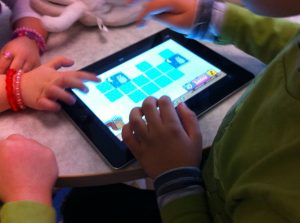
This week I had the pleasure of reviewing a MEd project written by my colleague and friend, Suzanne Agnew, Supporting Emergent Writers Through Digital Storytelling (2015, University of Victoria). When I first got my first teaching contract in the Sooke District, 6 years ago, Sue was very much a mentor to me and still is today. Over the years, Sue has saved class funds from year to year to purchase iPads for her classroom. This shows how much she values and embraces technology in her classroom. In Sue’s MEd project, she examined the research on Digital Storytelling (DS), discussed theoretical framework connected to DS, focused on implementing the Pictello App in her classroom and finally, created a professional development workshop for colleagues on DS. I very much enjoyed reading Sue’s paper and thought it was well organized. It has given me a glimpse of how my final project could look in the end. I also like the idea of creating a professional development workshop as part of my MEd project to share my learning with others in a practical way.
Here are some quotes from Sue’s MEd project that have stuck with me:
- “My emergent writing students flourished after learning how to use this app! Free of the limits of paper, their stories emerged. My students were so motivated to write, they spent their free time creating and sharing their unfinished and finished creations. The joy of writing had developed in many students who once saw writing as a daunting and onerous task. This excitement for digital storytelling was so explosive, it broke the walls of the classrooms as students eagerly shared their stories with adults and students outside of the classroom and of the school.” (after Sue began implementing the Pictello App)
- “Their digital stories were as expressive, engaging and creative as their oral stories. Calkin’s (1994) reminds us that it is “adults who have separated writing from art, song, and play; it is adults who have turned writing into an exercise on lined paper, into a matter of rules, lessons, and cautious behaviour” (p. 59).”
- “Students are constantly engaged and exposed to multimedia including texting or emailing friends, looking up information on the Internet, or creating virtual worlds, and yet many classrooms are not reflecting the value of bringing this into the classroom.”
- “I want them to see the benefits of expanding their views on writing to include technology. I share the view with Lucy Calkins that every child is a writer we just need to provide them with multiple ways to access their writing potential.”
Sue’s research reminds us that our teaching needs to reflect the ever-evolving world around us. She also highlights how we need to utilize technology to engage children and to help access their full story telling capabilities that simple pencil/paper can’t do. Making connections from this MEd project to assignment 1, I wanted to learn more about the Pictello App. Here is a YouTube link that gave me some basic information on how to use Pictello:
https://www.youtube.com/watch?v=pM6fcBoP4I8
Through some more investigation, I discovered that Pictello is also a great app to use with students, with special needs. Here is a website that gave me more insight on how this app can be utilized further.
https://www.assistiveware.com/products/pictello
Moving forward, I sent an email to my admin team this week suggesting various schedules for how our 12 school iPads can be used this year in the primary classrooms. I am hoping that our iPads will be up and running soon so that I can start trying out Apps such as Pictello!
“iPad_children_hands” by lottech is licensed under CC BY-NC-SA 2.0
Recent Comments